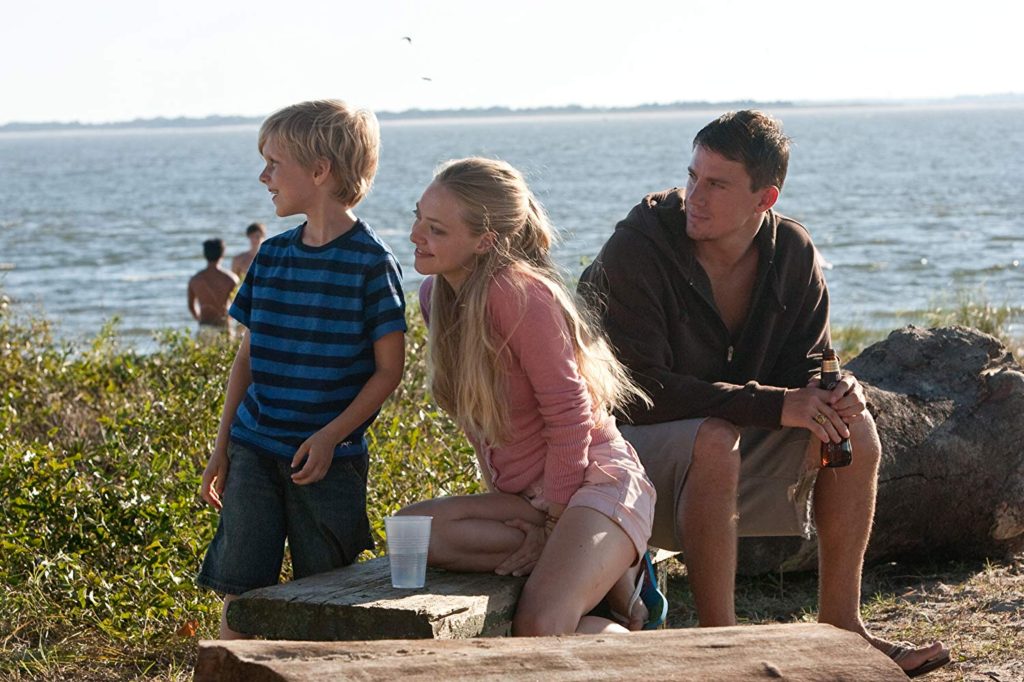My great sin is I watched “Dear John” expecting Nicholas Sparks to defy my expectations, and somehow still wound up disappointed. I know, shame on me. The film caught my attention, both for its premise of love between a soldier and a student, and for its idyllic seaside setting. It seemed the perfect addition to our “Fall in Love With February” series. I like Channing Tatum, thought he was engaging in “White House Down” and downright likable in “21 Jump Street;” and the romance between he and Amanda Seyfried seemed innocent and wistful in its setup.
But this is a Nicholas Sparks story; and, while I expected tragedy, I didn’t expect one on this level, or one so shoddily composed. Sparks, who penned the well-received “The Notebook” and the irritably-concluded “Message in a Bottle,” here is unable to stop himself from heaping one tragic arc after another onto his characters. “Dear John” is a twisty/turny film, but one whose twists and turns exist not as purposeful narrative, but as Hail Mary passes aimed at pushing you to grab the Kleenex. But, after investing a fine first and second act in likable characters and their stories, the film’s third act slaps your face with incredible occurrences that all but erase its preceded charm.
At the film’s onset, we’re introduced to John (Channing Tatum), who has a meet cute with Savannah (Amanda Seyfried) when he jumps into the South Carolina surf to rescue her purse. Sure, it’s cliché, but who cares? John is a soldier on leave, and the two, hitting it off quickly, make a believable couple who explore each other carefully. John has a past, which he guards, and Savannah is sweet and kind. She’s on spring break, spending her time reluctantly at beach parties when she’d rather feed her passion to open a summer camp for autistic kids or rebuild houses. She wants to study special education, she says; and then there’s a painful exchange where she sees autistic traits in John’s dad (a perfect Richard Jenkins) and just wants to help, but of course John rejects her insights (my dad’s not retarded!).
Of course, we’re not mean to believe John actually believes this, but the film needs a conflict to insert before he returns overseas…and voilà. But John writes her a letter, and she visits him before he leaves and writes one back. The two are in love and make a promise to write frequently over the next 12 months until John returns and they can finally be together. Of course a string of events, such as combat, John’s ailing father, and 9/11 make a happy ending for the pair unlikely.

What’s a shame about “Dear John” is that while you can see predictability seeping through the script, it offers glimmers of a better movie that’s never discovered. It has its highs, such as the idyllic community that makes up Charleston, and attempts at honest conversation between its characters that are emotional and real. The best of these are between John and Savannah (even when solely via letters), and others between John and his father during the periods of John’s leaves. A scene where Savannah and John attempt to drive his dad to meet her parents, but he can’t complete the trip due to his reliance on routines is painful to watch. But watch another scene between John and his dad at the airport and try to not let your heart sing.
The film even conjures up some great settings (and a matching soundtrack), letting the South Carolina coast chip away at its leads’ veneers—and their hearts—as well as some horrors of war that are juxtaposed with kind people on all sides that are just doing their best to get through the day.
The film inserts two others, Tim (“E.T’”s Henry Thomas) and his autistic son Alan (R. Braeden Reed), which are positioned sweetly—that is until Sparks and director Lasse Hallström open up Pandora’s Box and gum up the entire works. It’s not enough that the tragedies just keep on coming; it’s that they’re not even remotely believable in their presentation, the filmmakers believing that depressing, sad events piled one on top of the other make the idea of love stick. I hate to break it to Sparks and company, but lovers can stay together and have a romantic film work. But even if they must part (is this really a spoiler in a film like this?) there are ways to do it that enhance a narrative, rather than manipulate its viewers emotions.
In the process, the sweetest parts of “Dear John”—the chemistry between Seyfried and Tatum, the love and reconnection between John and his dad, and, yes, even the horrors of war—are traded for lazy exploitation. The final scene falls, and I suspect even filmgoers looking for simple romance and entertainment will yearn for something better.
“Dear John” is frustrating. It has the right pieces, the right actors, and a sweet message to impart that gets lost in the wind. John, Savannah, and company aren’t cynical, feel relatable emotions, and make you care for their outcomes during the film’s run. These are nice people who deserved a better story; but alas, “Dear John” simply isn’t the vehicle to deliver it.